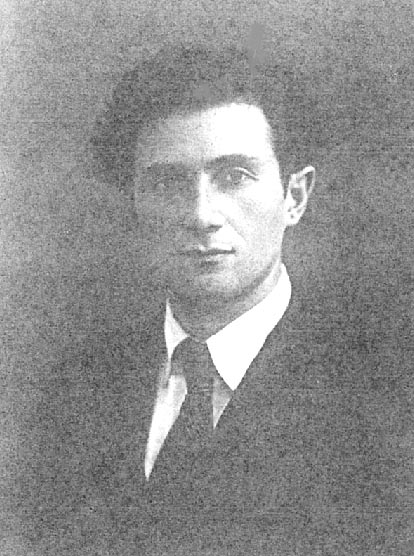Leib (Arye) Vilsker was born in 1919 in the town of Shumsk in Volyn Province (in present-day Ternopil Oblast, Ukraine). His father owned a carbonated water factory.
While the Vilskers were a traditional Jewish family, Leib became actively involved in the HeHalutz movement, and was planning to immigrate to the Land of Israel.
Everything changed in September 1939, when, in the aftermath of the Molotov-Ribbentrop Pact, the eastern part of Poland was annexed by the USSR, being divided between the Ukrainian and the Byelorussian SSRs. Leib Vilsker, who was twenty at the time, was drafted into the Red Army and sent to serve in the Soviet Far East. Because of the harsh conditions there, he began to suffer from a venous disease, which led to venous ulcers. He was treated at a military hospital. Following the outbreak of the Soviet-German War on June 22, 1941, Leib Vilsker was sent to the front, and he served in the railway troops. He met V-E Day in Estonia.
Leib took advantage of the law on the demobilization of military personnel wishing to study, and moved to Leningrad, where he enrolled in the Faculty of French at the Foreign Language Institute.
However, a year and a half later Lev switched to the Oriental Faculty of Leningrad State University, where he studied in the Department of Assyriology and Hebrew. This gave him the opportunity to learn the Hebrew language.
In 1950, Lev Vilsker graduated from the university, and was sent to work at the Mikhail Saltykov-Shchedrin Public Library (now the Russian National Library in St. Petersburg), in the department of Hebrew and Yiddish books (which was later renamed the Department of Asian and African Literatures). He worked there for many years.
In 1962, KGB agents photographed Lev with a relative who had come to visit him from Israel. The antisemitic heads of the department used this opportunity to demote Lev, moving him from the department of literatures to the acquisitions department. Five years had to pass before Vilsker was reinstated in his former post, following a change of management.
Throughout this time, Vilsker was active as a scholar, writing over a hundred papers on Semitic epigraphy, linguistics, lexicography, and source study. He adopted the pseudonym Shumsky, in honor of his hometown of Shumsk.
In 1970, Vilsker defended a candidate's thesis (A Study of the Samaritan Language), which was published in Moscow that same year.
In the second half of the 1970s, Lev Vilsker studied the Jewish manuscripts from the collection of the writer Avraham Firkovich, which were held at the State Public Library. Vilsker deciphered numerous previously unknown poems by medieval Jewish poets, including twenty-two works by Judah Halevi (one of these was an elegy on an anti-Jewish pogrom in Toledo in 1109). The poems were published in Hebrew, with an accompanying Yiddish translation.
Vilsker's first article about the formerly obscure poems of Judah Halevi appeared in the Sovetish Heymland magazine in 1982, and in April that year it was republished in the Israeli Maariv daily. These publications made quite a stir, and they led to many responses from experts in medieval poetry and historians of literature from all over the world, who regarded these poems as an important discovery.
Encouraged by this outpouring of interest, Lev Vilsker wrote several more articles on the subject, which enjoyed a similarly positive reception. He corresponded with numerous Israeli specialists, yet he never set foot on Israeli soil. On one occasion, he was invited by Harvard University to teach a course on the Hebrew manuscript collections of the Leningrad Public Library. However, the Soviet authorities prevented him from making this trip, since he did not belong to the exclusive group of Soviet cultural figures who were permitted to travel abroad.
Lev Vilsker died in Leningrad in 1988.
His descendants live in Israel.







